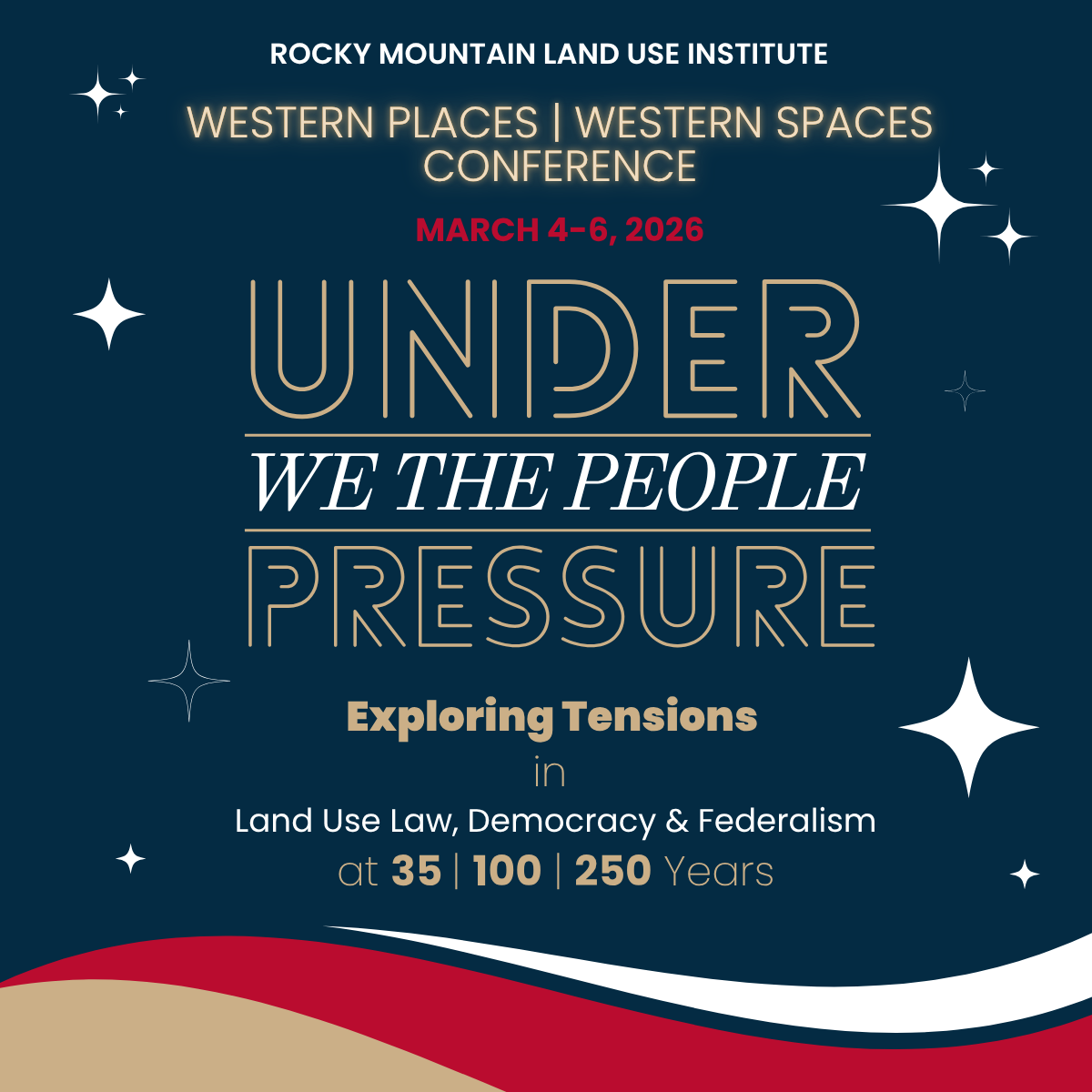WP | WS 2026 Conference
This year marks the 35th anniversary of the Rocky Mountain Land Use Institute, the 100th Anniversary of the U.S. Supreme Court’s landmark zoning case Euclid v. Ambler, and the 250th anniversary of our nation. As we look back and all around in order to look forward, we can’t help but think that rock legends David Bowie and Queen had it right: This is ourselves…under pressure.
2026 Conference Topic Tracks
Growth, Housing Affordability & Community Character
Growth V. Contraction
The Rocky Mountain Region is currently experiencing rapid population growth with an urgent need for housing. But demographic research indicates that households will shrink and markets will contract (and even reverse) in the decades to come. How do we plan for continued growth now while simultaneously preparing for a future of contraction or slowed growth, and the vastly different land use patterns and economic development needs that implies?
Affordability v. Market Forces
How do we ensure housing is attainable for all income levels and generations when market forces often push towards high-profit, less affordable developments, and when current regulations inadvertently contribute to higher costs?
Historic Preservation v. Development
How do we balance the urgent need to build new housing for a changing population, with the desire to preserve existing community character & historical assets?
Environmental Sustainability & Climate Adaptation
Energy Demand, Reliability & Affordability v. Development
How do we balance the need to develop resource intensive data centers to support emerging technologies and to support electrification based on clean energy, with the need to rapidly expand transmission and generation and keep ratepayer costs affordable? How do we balance these pressing energy demands with land use priorities, while meeting our decarbonization goals?
Hazard Risk Mitigation v. Development
How do we address the challenge of meeting increased housing demand while reducing risks of severe wildfires, floods, and other extreme events? How do enforce hazard mitigation codes and address the legal and political feasibility of restricting development in high-risk zones? How can we push for more proactive land use planning and/or legislation to reduce exposure while addressing property rights concerns?
Water Scarcity v. Development
How can we legally require water adequacy for new developments (e.g., data centers that can have intensive water cooling needs)? How can we successfully integrate water conservation mandates into local codes? How can we better connect land use development approvals to demonstrated long-term water supplies? What strategies might we employ to better manage our shrinking water supplies?
Habitat Protection v. Development
How can we prevent development from consuming and fragmenting critical wildlife habitats and corridors? How can we overcome legal challenges to conservation easements and compensation/mitigation programs for development impacts? What strategies would support conservation-oriented development?
Climate Resilience v. Existing Infrastructure Development
How can we successfully mandate/implement/incentivize codes that promote climate resilience to reduce carbon emissions, promote stormwater management, reduce urban heat zones?
Federalism & The Role of Government
State Preemption v. Local Control
How do we address statewide issues (housing affordability) or promote regional development patterns without infringing on self-governance? What can we learn from ongoing legal challenges to state law that threatens municipal home-rule?
Federal Mandates v. State & Local Control
How might recent federal changes to environmental laws, FEMA, HUD, and other federal programs impact state and local planning efforts and finances? How can state/local governments exert more influence on federal land management decisions that profoundly impact their communities, infrastructure and economies?
Intergovernmental Coordination v. Urban / Rural divide
How can we overcome fragmented legal authorities, funding mechanisms, and institutional barriers that inhibit intergovernmental coordination and preclude collaboration on regional issues (e.g., air quality/water adequacy/transportation access/regional housing shortages)? How can we ensure that planning needs unique to rural communities are adequately addressed and not lost in multi-jurisdictional solutions?
Democracy, Deliberation & Community Engagement
Traditional Governance v. Inclusive Deliberation
Traditional public-engagement and decision-making processes in land use can often lead to misrepresentation or opposition. How can we push to ensure that democratic processes in land use are more representative, inclusive, intergenerational, and consensus-driven? What alternative deliberation models can help us build better coalitions, develop broader consensus, and support better decision-making?
Democratic Deliberation v. New Data & Technologies
How do we ensure that new digital technologies for public participation and online engagement don’t create new forms of exclusion? How can we ensure that human oversight in data-driven planning doesn’t replace authentic discourse and community led decision-making?



